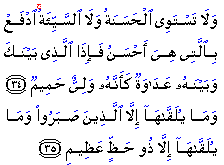General
From Issue: 436 [Read full issue]
| Living the Quran |
Surah al-Fussilat (Revelation Well-Expounded) When the Caliph Umar b. al-Khattab entered Jerusalem to receive the keys to the city, he was invited to pray inside the church, but he declined. He refused to do so, though he was in a position of strength and could do as he pleased. He refused, though he did not in any way disdain praying in the church. He said, showing great foresight and sensitivity: “I fear that if I pray inside, the Muslims of future times will wish to pray in the same spot and will cause discomfort for the church’s congregation.” Kind treatment, genuine concern and friendship, treating others well in words and in deeds – these are the ways to bring an end to hatred and reconcile people as mentioned in the verse. Coexistence preserves human life. It opens the doors to dialogue. It is the atmosphere in which the Message of Islam prospers, where it can present itself with the reason, evidence, and logic that so enriches the Quran.Source: |
| Understanding the Prophet's Life |
Water leftover after people have drunk from the pot According to the shariah, such water is considered pure regardless of whether the one who drank from the pot was a Muslim, an unbeliever, a person in post-sex impurity or a menstruating woman. Although Allah says in the Qur'an, "Verily, the idol worshippers are impure" (at-Taubah) this is a reference not to their physical state, but to their false beliefs and creed. They may come into contact with dirt or impurities, but this does not mean that their possessions or bodies are impure. In fact, they used to mix with the Muslims. Their emmissaries and delegations used to visit the Messenger of Allah and enter his mosque. The Prophet, upon whom be peace, did not order that the objects they touched be cleansed. As for mensturating women, 'Aishah said, "I used to drink (from a container) while I was menstruating. I would then pass it to the Messenger of Allah and he would drink from the same spot where I had put my lips." (Related by Muslim.) Source: |
| Cool Facts! |
Islam In Nigeria Islam found its way to Nigeria about two centuries ago, starting from the north of the country, and was brought by Arab and Muslim merchants who came not only for business purposes, but also for spreading the word of Allah. From the north, Islam then spread to the south of the country, and now it is spreading to all the other parts. It was from the south that Christianity found its way into Nigeria, brought to the country by the British colonizers. Nigeria’s population is now in the region of 120 million, as per the 1996 census, with Muslims accounting for 80,000,000 (70 percent of the population), with Christianity and animism followers making up the rest of the population. There are 333 tribes in Nigeria, the most prominent being the Hausa, said to be the largest tribe in Africa, and they are mainly concentrated in the northern part of the country and some of the neighboring countries of the north. The Hausa are followed by the Yorubas, who are mainly concentrated in the south of the country, and the Ibos in the east. Each of the tribes has its own customs and traditions, just like tribes in the rest of the world. Christian missionaries have intensified their efforts in trying to convert the Muslims, taking advantage of the economic weakness of the Muslims and helping them improve their conditions by extending a helping hand to them. The result is that many Muslims now are only Muslims nominally, and they no longer see the difference between the two religious faiths. However, the Muslim activists are trying to counter the Christianization efforts by educating the Muslims on the various aspects of Islam. By the Grace of Allah, their efforts are paying off, despite the scarcity of their resources. Source: |
